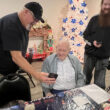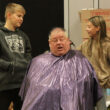Sean C. Morgan
Following a public hearing, the Sweet Home City Council agreed on Jan. 27 to remove temporary dwelling units for medical hardship purposes from its list of conditional uses in low-density residential zones.
The council’s action was in response to a recommendation from the Planning Commission, which had held its own public hearing on the issue Jan. 5.
Over the years, the city has approved conditional uses for temporary dwelling units for medical hardships 13 times, said Planning Services Manager Laura LaRoque. Of those, 12 were for the use of RVs and one was for a manufactured home.
In 2013, the Planning Commission removed the review criteria for conditional use permits for medical hardships.
The commission removed the criteria, but probably forgot to remove the title, said City Manager Craig Martin. The commissioners had been concerned about applicants having to share medical information in a public hearing.
In November, the Planning Commission held a work session to decide whether to develop criteria or remove medical hardship from the list of conditional uses.
The Planning Commission has received applications for a couple of medical hardship conditional use permits, LaRoque said, but it didn’t have any criteria to use.
The decision does not remove the ability of property owners to apply for a conditional use permit for medical hardships, LaRoque said. The list of conditional uses does not include every possible conditional use.
Without the medical hardship listed in the ordinance, such a request would rely on the general criteria for conditional use permits, LaRoque said.
‘This kind of dissuades that kind of conditional use, but it doesn’t prohibit it.”
Council members noted that the new arrangement should correct some problems.
“What’s the purpose of the list if it doesn’t tell you what’s permitted and what’s prohibited?” asked Councilor Jeff Goodwin.
Property owners would no longer need to bring medical information into a public hearing, said Mayor Jim Gourley. The permit would rely on the general criteria for a conditional use permit.
Other conditional uses, which are listed, are uses for which the commission and council have seen a need for additional criteria, Martin said.
Councilor Bruce Hobbs noted that a property owner may want a temporary dwelling for medical hardship for four months while being allowed only 60 days under the new RV ordinance. The property owner could ask the Planning Commission for a conditional use permit anyway.
A neighbor might say he doesn’t want it, Hobbs said, and the commission can add conditions and limit how long the permit is valid.
Goodwin said he still finds the request a little confusing, but the council should move on as long as it’s clear that the council is not restricting the use of the land.
The council voted 7-0 to approve the revision.
Present at the meeting were councilors Hobbs, Goodwin, Gourley, Greg Mahler, Marybeth Angulo, Ryan Underwood and Dave Trask.
In other business, the council:
n Appointed William C. Wallin to the Traffic Safety Committee. The council had previously held off on the appointment to hear more about why Wallin had applied and over concerns about over-representing the First Avenue and Nandina Street area.
Counting Wallin, the area has three residents of that area on the committee.
“Are you joining the Traffic Safety Committee just for that purpose?” Mahler asked Wallin.
Wallin told the board he is unbiased and just wants to get involved in the community, but he did explain the residents’ concerns about First Avenue to the council.
They are concerned about speeders, trucks and the heavy traffic volume, Wallin told the council.
The city is planning to install speed tables on First Avenue.
“This would divert traffic to the light, where it should go anyway,” Wallin said.
The council voted 7-0 to appoint Wallin to the committee.
n Appointed Aaron Pye to the Tree Commission.
n Appointed Mona Waibel to the Parks Board. Pye had also applied for the position.




